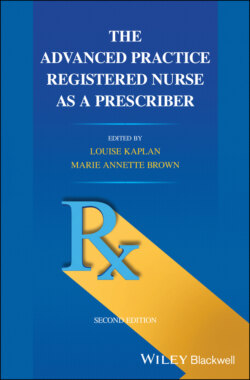Читать книгу The Advanced Practice Registered Nurse as a Prescriber - Группа авторов - Страница 16
DEVELOPMENT OF THE APRN ROLE AND PRESCRIPTIVE AUTHORITY Prescriptive authority
ОглавлениеPrescriptive authority is the legal ability to prescribe drugs and devices, a practice regulated by the states. One aspect of prescriptive authority, controlled substances (CSs), is specifically regulated by the federal government through the Drug Enforcement Administration (DEA) which enforces the Controlled Substances Act of 1970 (Title 21 – Food and Drugs, 1993). Some states have additional regulations and requirements related to prescribing CSs.
Obtaining prescriptive authority for APRNs has presented significant challenges nationwide. Even when prescriptive authority is supported in new legislation, significant roadblocks to implementation often occur, particularly those placed by physicians. In 1971, for example, Idaho became the first state to pass legislation that recognized the NP role and granted prescriptive authority. Although the first Idaho NP entered practice in 1972, opposition from the Board of Medicine resulted in more than one‐dozen drafts of the prescriptive authority rules. The rules were not adopted until 1977, making Idaho the first state to implement prescriptive authority for NPs (personal communication, S. Evans, December 28, 2009). Nearly 30 years later, in 2006, Georgia became the last state to pass a law granting APRNs authority to “order” medications, a variant of prescribing (Phillips, 2007). An example of a current barrier exists in Colorado. After program completion, an APRN must first qualify for provisional prescriptive authority (RXN‐P). Within three years of receiving RXN‐P status, the APRN must complete a 1000 hour mentorship with a physician or APRN with full prescriptive authority (RXN) and develop an articulated plan for safe prescribing to receive full prescriptive authority (Code of Colorado Regulation, 2017).
